#kenyan feminists
Explore tagged Tumblr posts
Text
"Demonstrations are taking place across major cities in Kenya to protest against the rising cases of femicide and other violence against women.
Hundreds have gathered in Nairobi, Nakuru, Mombasa, Nyeri and Lodwar, some carrying placards with the names of those who were killed.
A 2022 survey found at least one in three Kenyan women had endured physical violence at some point in their lives.
"I am here because I'm angry," 33-year-old Winnie Chelagat told the BBC.
"It is wrong, we are tired and we want something to be done about it."
Men and boys must take responsibility for their own actions instead of the burden being on women and girls to protect themselves, said another protester called Michael Onyango."

515 notes
·
View notes
Text

Wangari Mathenge —They Said He Was A Dandy But What Do I Know Of A Jogging Dandy (oil on canvas, 2022)
637 notes
·
View notes
Text
“The term ‘child’ marriage should perhaps be seen as a euphemism because this practice is gendered, and it is overwhelmingly girls and not boys who are subjected to it. The difference is stark, since in Mali the girl:boy ratio of marriage before age 18 is 72:1, in Kenya, 21:1, and even in the United States it is 8:1”
Sheila Jeffreys, The Industrial Vagina (2008)
#sheila jeffreys#feminism#child marriage#child exploitation#child abuse#sexism#abuse of girls#abuse of women#mali#kenya#usa#united states#malian women#kenyan women#american women#feminism in mali#feminism in kenya#feminism in america#sexploitation#feminist theory#gender roles#gender based violence#sex based violence#sex based oppression#patriarchy
100 notes
·
View notes
Text

Backlash Blues by Wangechi Mutu, mixed media on mylar, 2004
#art history#contemporary art#women artists#afrofuturism#african art#feminist art#art curator#curators on tumblr#wangechi mutu#kenyan art
38 notes
·
View notes
Text
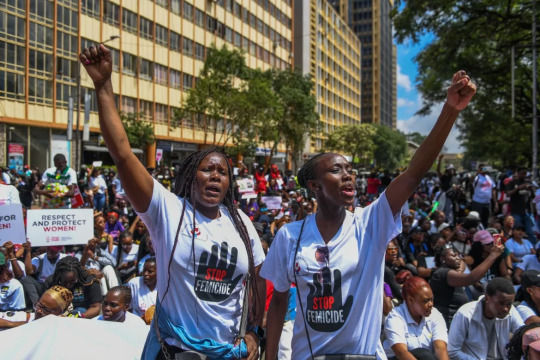
Thousands protest against increasing violence against women in Kenya as they march to the parliamentary building and supreme court in the capital Nairobi [Gerald Anderson/Anadolu Agency]
Published On 27 Jan 202427 Jan 2024
Thousands of people have gathered to protest in cities and towns in Kenya against the recent slayings of more than a dozen women.
The anti-femicide demonstration on Saturday was the largest event ever held in the country against sexual and gender-based violence.
In the capital, Nairobi, protesters wore T-shirts printed with the names of women who became homicide victims this month. The crowd, composed mostly of women, brought traffic to a standstill.
“Stop killing us!” the demonstrators shouted as they waved signs with messages such as “There is no justification to kill women.”
The crowd in Nairobi was hostile to attempts by the parliamentary representative for women, Esther Passaris, to address them. Accusing Passaris of remaining silent during the latest wave of killings, protesters shouted her down with chants of “Where were you?” and “Go home!”
“A country is judged by not how well it treats its rich people, but how well it takes care of the weak and vulnerable,” said Law Society of Kenya President Eric Theuri, who was among the demonstrators.
Kenyan media outlets have reported the slayings of at least 14 women since the start of the year, according to Patricia Andago, a data journalist at media and research firm Odipo Dev who also took part in the march.
Odipo Dev reported this week that news accounts showed at least 500 women were killed in acts of femicide from January 2016 to December 2023. Many more cases go unreported, Andago said.
Two cases that gripped Kenya this month involved two women who were killed at Airbnb accommodations. The second victim was a university student who was dismembered and decapitated after she reportedly was kidnapped for ransom.
Theuri said cases of gender-based violence take too long to be heard in Kenyan court, which he thinks emboldens perpetrators to commit crimes against women.
“As we speak right now, we have a shortage of about 100 judges. We have a shortage of 200 magistrates and adjudicators, and so that means that the wheel of justice grinds slowly as a result of inadequate provisions of resources,” he said.

People gather to protest in an anti-femicide demonstration, the largest event of its kind ever held in Kenya. [Gerald Anderson/Anadolu Agency]
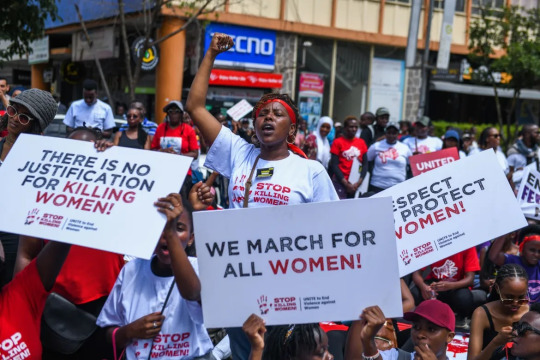
Kenyan media outlets have reported the slayings of at least 14 women since the start of the year. [Gerald Anderson/Anadolu Agency]

A protester holds a Palestinian flag during a march to protest against the rising cases of femicide, in downtown Nairobi. [Brian Inganga/AP Photo]
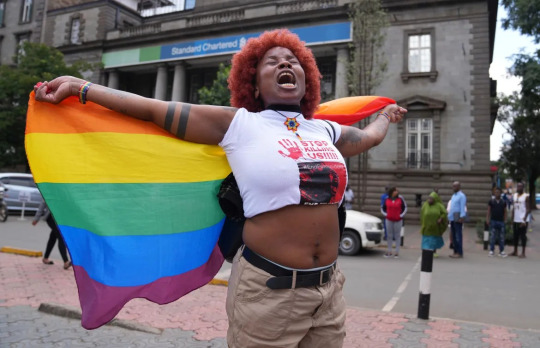
Women and feminists in Kenya took to the streets to march against the rising cases of femicide. [Brian Inganga/AP Photo]

In Nairobi, protesters wore T-shirts printed with the names of women who became homicide victims this month. [Gerald Anderson/Anadolu Agency]
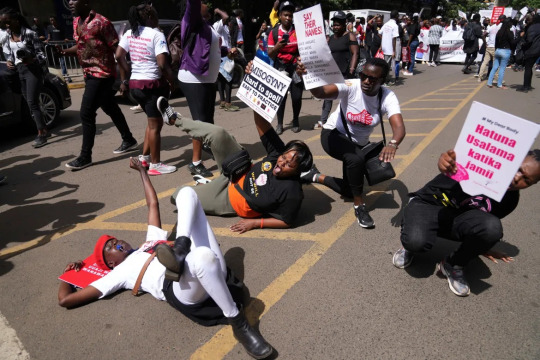
Protesters react against the rising cases of femicide. [Brian Inganga/AP Photo]
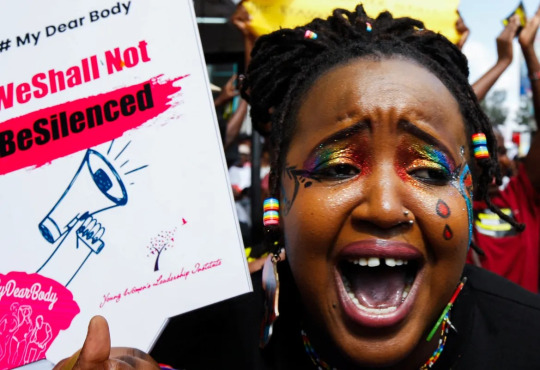
A human rights activist reacts as she attends a protest demanding an end to femicide in the country. [Monicah Mwangi/Reuters]

Protesters gather during the anti-femicide demonstration. [Gerald Anderson/Anadolu Agency]

The crowd, composed mostly of women, brought traffic to a standstill. [Gerald Anderson/Anadolu Agency]
#Kenya#Femicide#Nairobi#There is no justification to kill women#The court systems taking too long to hold perpetrators accountable#The power of women standing together#Please reblog#Western media isn't going to give this the coverage this deserves
2K notes
·
View notes
Text
Sex Strikes
Did you know something like the 4B movement has been going on since as early as Ancient Greece?
Greece: Lysistrata, in which women team up to bring about the end of the Peloponnesian War.
In 1600, Iroquois women refused to engage in sex as a way to stop unregulated warfare. The tactic worked: They gained veto power concerning all future wars and paved the way for future feminist rebellions.
In 2003, Leymah Gbowee organized a well-publicized sex strike to end Liberia’s brutal civil war. Not only did warlords agree to end the violence, Gbowee was later awarded a Nobel Peace Prize for her efforts.
In 2006, female partners of gang members in the Colombian city of Pereira withheld sex to demand civilian disarmament and a reduction in violence. According to the Global Nonviolent Action Database, the strike’s results were clear: Pereira’s murder rate fell by 26.5% by 2010, a huge accomplishment for a city that had a homicide rate twice the national average when the sex strike began.
In 2009, Kenyan women enforced a sex ban until political infighting ceased. Within one week, there was a stable government. And in the Philippines, a sex strike led to peace in a violence-plagued Mindanao Island village.
The reason these were effective were because there were clear goals in mind, and enough people enforced it. So... I'm just saying... this 4B movement has historical proof of effective results.
(Also you can fact-check me if you want.)
14 notes
·
View notes
Text
For as long as Nelly Naisula Sironka can remember she has never wanted children - and with one irreversible decision the 28-year-old Kenyan has ensured she never will get pregnant.
Last October, she took the definitive step of undergoing a sterilisation procedure known as tubal ligation - permanently closing the door on motherhood.
"I feel liberated," theorganisational development expert tells the BBC, adding that it has ensured her future is now entirely her own.
The operation prevents pregnancy by blocking a woman's fallopian tubes and is sometimes referred to as "getting your tubes tied".
Between 2020 and 2023, roughly 16,000 women in the East African country underwent tubal ligation, according to Kenya's health ministry.
It is unclear how many of these women didn't already have children.
Yet Dr Nelly Bosire says the kinds of women coming forward seeking sterilisation in Kenya is changing.
"Traditionally, the most common candidates for tubal ligation were women who already had multiple children," the Nairobi-based gynaecologist told the BBC.
"But now, we are seeing more women with fewer children opting for the procedure."
Sterilisation is only recommended for women who are certain they do not want to have biological children in the future, as reversal is difficult.
"Doctors don't typically encourage tubal ligation because the success rate of a reversal is very poor," said Dr Bosire.
Despite coming from a large family, Ms Sironka said she never felt pressured to start her own - though societal norms in Kenya do place an expectation on women to have children.
She credits her father with her stance as he encouraged her to focus on education - and gave her a love of reading.
Books by US feminist authors like Toni Morrison, Angela Davis and bell hooks were a revelation.
"I interacted with women's life stories that didn't feature children at all," said Ms Sironka, who is now the chief of operations at Feminists in Kenya, an organisation which works to end gender violence.
"It made me realise that a life like this was possible."
She had contemplated sterilisation for years, but decided to go ahead after saving up the money for the operation and finding herself in a stable job that allowed her to take time off.
It cost her 30,000 Kenyan shillings (£190; $230) at a private hospital.
Ms Sironka felt that women's rights were being eroded around the world - especially as women in the US lost the constitutional right to abortion in 2022, which also influenced her decision.
It made her fear that a woman's right to control her own body might be eroded elsewhere - and that she should do the procedure while she still could.
"Within Africa and in America, there has been a rise in fascism and authoritarian regimes, a perfect example of such is Kenya," she argued.
When she told her family, it did not come as a surprise to them, as she had always been very vocal about her desire for a child-free life.
And as for dating and relationships?
"I'm still thinking about it," she said with a shrug.
And Ms Sironka is not alone in choosing a child-free life, challenging traditional expectations of womanhood.
Across social media, there are those speaking openly about their choice not to have children and undergo sterilisation.
Among them is Muthoni Gitau, an interior designer and podcaster.
She shared her tubal ligation journey in a 30-minute YouTube video last March, explaining her decision to have the procedure.
"I think the first time I ever articulated... [that] I did not want to have children, I was about 10," she told the BBC.
Her mother was heavily pregnant at the time, and a random question about her future popped into the conversation.
"I saw a possible partner. I saw travelling. I just never saw children," she said.
Like Ms Sironka, Ms Gitau's decision was driven by a strong conviction to live life on her own terms.
After trying birth control pills, which she said made her nauseous, she sought a more permanent solution.
When she first approached a doctor about tubal ligation at the age of 23, she was met with resistance.
She was given what felt like a sermon about how children were a blessing from God.
"He asked me, 'What if I meet someone who wants kids?'" she said.
The doctor seemed to have more consideration for an "imaginary person" rather than the actual patient sitting in front of him, she said.
Ms Gitau said the dismissal was "heart breaking". It was another decade before her wish was finally granted.
Dr Bosire points out that a significant challenge in Kenya is getting medics to shift their mindset and truly appreciate a patient's right to make decisions about their health.
"This ties in with our culture, where people believe it isn't normal for women to want a tubal ligation," she said.
Another Kenyan gynaecologist, Dr Kireki Omanwa, admitted the issue was a matter of debate amongst colleagues and in medical circles.
"It remains inconclusive," he told the BBC.
But Ms Gitau was not deterred and last year approached another doctor - this time at a non-governmental organisation that provides family planning services.
She was armed with a bullet-point list of reasons to support her decision and was relieved to find there there was no pushback: "The doctor was very kind."
Currently single, she is living happily with her decision, which she feels gives her control over her own life.
The 34-year-old is also happy with the reaction to her video - and relieved that there has been no major backlash.
She says most people online have been cheering her on, which has seen her confidence grow.
"Women can contribute to the world in so many other ways," she said.
"It does not have to be through raising a whole human being. I am grateful to live in a generation where choice is a thing."
3 notes
·
View notes
Note
17 for the book ask?
Oh! I feel like i was surprised by how good a lot of books were this year - I'm not sure I often have expectations of books or sometimes when I'm really overexcited for a book, it's a letdown to read it, but I'm going to flag some favourites from this year where I didn't know the author at all before:
Joseph Pontus, On the Line: Notes from a Factory - complete impulse read from the library; a set of poems by a French social worker who finds himself working a factory job packing seafood because he's living with his girlfriend in Brittany, and there's no other work there. There's one poem just about his hatred of pressing tofu. But it was so good - fascinating and crushing and transcendent about the boredom and pain and unfairness of manual work. It really made me think how few books get published, particularly since the 1970s, about the experience of blue-collar work; how much it's still invisible. And what good poetry it was.
Swing Time, Zadie Smith. I'm a British book nerd who never had read a Zadie Smith book before 2024 somehow and this was again, an impulse read from the library which I loved - not so much for the exact details of the plot but for Smith's authorial voice, for the flow of ideas and observations, for how witty it was.
Nowhere in Africa, Stefanie Zweig. One of feuilljska's books I read while down with Covid, a memoir of fleeing as a Jewish refugee family to Kenya - the family decide to go back to Germany in 1946, and I have the author's sequel memoir about *that* on my shelf. It's such an immersive child's-eye view, full of romance and adventure as well as the wrenching trauma and dislocation the family suffers, and the complex and touching relationship between the refugee farmers and the Kenyans they interact with; history always gets more complex than you think.
Night Theatre, Vikram Paralkar. Thank you library! I wrote this book up already but it was *so* good and I had no idea what to expect when I picked it up.
Namesake, N.S. Nuseibeh. Another library pick - this one the memoir of an author named after a famous Muslim warrior woman, exploring the idea of what her relationship to her namesake means and the idea of being a warrior woman as a modern British-Palestinian woman who goes to her friend's seders and reads feminist theory. It was such a thoughtful, deep, wideranging book and really touched me - I think I've given quite a reductive summary.
5 notes
·
View notes
Text
Book Review #12 - Storm: Dawn of a Goddess

☕₊˚ʚ ᗢ₊˚✧ ゚.📚
Copper-brown skin, crystal-blue eyes, flowy white hair - these are some traits of herself that Ororo Munroe has a hard time embracing. Along with magical powers that attempt to stand up to even Mother Nature. This young descendant of a mysterious Kenyan tribe then spends her time in this tale uncovering the mystery behind her identity across a thrilling adventure from Egypt to her homeland, chased by a seemingly shape-shifting villain who threatens to take control of every single one of her nerves.
This novel nails the growth of a young hero harnessing her superpowers and the responsibilities associated with it. It achieves this in an easy manner to read through, with descriptive yet simple vocabulary that the target audience will be able to digest. The story also flows smoothly, with most plot obstacles being of the right intensity and length. The different African countries through which Ororo travels and experiences life are beautifully described, with a great tribute to the rich culture and tradition that they hold. The highlight of this book would be her self-acceptance journey, because it plays a huge role in her success in the climax act. While having such a strong female lead and supporting characters, I would say that the drawback of this book lies in the romance aspect. The love interest has too much of an influence on her and it takes away from emphasizing her independence and strength. While this flaw is somewhat addressed towards the end of the book where Ororo decides to pursue her life's calling, it would have been better if the dynamic was more light-hearted and slow, rather than rushed and serious. Sometimes, Ororo's angst felt too much and it distracted from the plot's sense of urgency, and that was frustrating to get through. Lastly, I feel like even though this book kept readers wanting more, the suspense could have been spread over a few defining challenges rather than many consecutive ones (this diminished the graveness of each danger that she faced).
This book is clearly intended to reach a teenage audience with the way the character's conflicts reflect the mind of a maturing woman finding her place in the world. I like the feminist messages in this book, despite the previously mentioned drawback of male centeredness. Storm also encourages embracing nature and the beauty of planet Earth, a reminder we need in this period of uncertain climate change. I would also recommend this book to fans of Storm from Marvel to have their take on this perspective of their favourite character. Seeing a FMC of color definitely makes me look forward to see a sequel of Ororo's story.
Rating: 3/5 Stars Edition: Paperback, 2024 Signing off till next time~
☕₊˚ʚ ᗢ₊˚✧ ゚.📚
Are you interested in reading this book? Let me know in the comments below!
Follow @mia-studyhaus for more book reviews!
#studyblr#learning#study#knowledge#english#languages#vocabulary#englishvocab#books and reading#goodreads#reading#books#currently reading#long reads#bookish#booklr#book quotes#bookblr#new books#book review#book#read#reader#readings#fiction#marvel#storm dawn of a goddess#storm#novel#author
4 notes
·
View notes
Link
2 notes
·
View notes
Text

Wangari Mathenge —They Said He Was A Dandy But What Do I Know Of A Jogging Dandy II (oil on canvas, 2022)
253 notes
·
View notes
Text
How to fall in love via Deneuve Magazine Personal Ads Circa 1993
❖ Go to your mailbox and see that your latest issue of Deneuve magazine has been delivered. It’s in a plain brown envelope, but you still take it all the way inside the house before you open it.
❖ Take a moment to gaze at the cover and appreciate the fact that it’s named after Catherine Deneuve in honor of her sex scene from The Hunger which awakened us all.
❖ Flip past the first few pages of ads. Do I want to fax away for a brochure about the chance to go on a Kenyan photo safari with the world’s first out lesbian commedienne? What about the Olivia Thanksgiving cruise?
❖ Enjoy the Editor’s Column about how our new President Clinton has pledged to make real progress for the LGBT community. Bask in the warm glow of happiness knowing that the gay dark ages are finally coming to a close.
❖ Chuckle at Alison Bechdel’s ad for the Feminist Bookstore Network and wish you had one of those stores near you.
❖ Keep up with the state of the lesbian nation via the letters to the editor. Aren’t the repressive laws being passed in Oregon and Colorado shocking? Goddess bless that Kentucky baby dyke having to dodge the KKK at her high school 🙁
❖ Read the wedding announcements and get all choked up, remembering why you’re here. Resist the urge to flip to the end and see if there’s anyone new from last month. Hope springs eternal!
❖ Oh, the 20th anniversary of Naiad Press! I love their stuff! Especially how all the covers look like they’re printed with ink that was on sale. I wonder if they have any more copies of that Lesbian Queries book from 1990???
❖ Audre Lorde sure is gonna give them hell at the march on Washington, eh?
❖ So many bookstores. So many books.
❖ An article about Safe Sex! Hell yes! Even though lesbians don’t get AIDS because we’re God’s chosen people, this will be fun to read about in theory! “After all, aren’t we told that lesbians and priests are in the lowest risk category?” lol people thought priests weren’t constantly having gay sex. Simpler times.
❖ An interview with Alison Bechdel! She’s so swoony.
❖ Articles about soap operas, speculation about Hilary Clinton, gossip about Madonna and Sandra Bernhard. And what about Whoopi Goldberg? And that Ellen lady? She’s been on Arsenio Hall acting all cagy about the men in her life. A list of women we wish were gay, including Joan Jett? Didn’t she sing Crimson and Clover without changing pronouns like waaaaay back in the 80s
❖ Music reviews: Sweet Honey in the Rock and Alix Dobkin! We’re almost to the ads…
❖ Labrys jewelry, freedom rings. C’mon, let’s get to the good stuff!
❖ Here we go! Classified ads– 30 words for $20! Queer personal finance, we buy used computers, a lesbian resort in New Hampshire.
❖ Personals at last! Is my woman here?
❖ Hey there’s that woman who has an ad every month expressing her ‘complete and sincere respect for’ women in military, fire, police, private security, corrections’. A gay male ad would say ‘Uniform fetish’ but apparently we’re too delicate.
❖ Bisexual boston babe ‘femalely handsome’ looking for someone who’s ‘nice to look at, not a feminist and not a bitch’. Next!
❖ Lonesome in Wyoming, Bisexual Bodybuilder, Softball is over, time to find someone warm for winter, Reubenesque Arkansas Buddhist…
❖ Find a girl who sounds promising– seems interesting and is not too far away. Spend a day or so composing a letter with a pen and piece of paper introducing yourself. If you don’t have a photo of yourself that you like, have a friend take one. Then finish the roll of film and bring it to the Fotomat and wait a day or so and then pick up the prints and hope you like one of them. Choose one anyway, and put it in the envelope with your letter.
❖ Get a stamp, hang it on the mailbox, never hear anything ever again.
❖ One month later, go to your mailbox and see that your copy of Deneuve has arrived.
#lesbian queries#lesbian query of the day#Deneuve magazine#personal ads#lesbian love#lesbian sex#yay lesbians
6 notes
·
View notes
Text
Wangechi Mutu
“I create as a way of reinvigorating myself by replacing and reworking images and ideas that never fully represented me and the women and the people I was born from and who made me,” Wangechi Mutu has said.1 Born in Nairobi, Kenya, in 1972, the artist relocated to the US in the mid-1990s to study fine art. Her experience of migration and her diasporic identity have infused the artist’s creations with an expansive philosophy of belonging: “If a plant has just one root that doesn’t necessarily mean it’s going to stand straight and strong. The idea of having many roots, of having your feet really grounded in different places, is extremely empowering for me.”
Mutu is committed to reshaping the narratives of womanhood; by doing so, she challenges Western culture’s racist and misogynistic tenets
In her collages, sculptures, videos, and performances the figure of the woman is depicted with the complexity and profundity of a timeless archetype
As the artist explained the origin of her collage-making practice,
“I took these idealized stereotyped images of women and Eden-like ‘tropical’ images of Africa to create other images, tension-charged, potent, because they were full of my own emotional upset at the original ones…I was taking apart the images of a world that refused to acknowledge me.”

In Yo Mama (2006), the heroine—modeled after Funmilayo Anikulapo-Kuti, the Nigerian feminist and mother of the legendary Afrobeat musician Fela Kuti—embodies the role of Eve, the biblical first woman. She stands atop a beheaded snake, piercing its severed head with the stiletto heel of her boot. The serpent’s coiling body unravels placidly through the pink outer space, holding the two panels of the collage together as its tail wraps around a distant planet. Mutu’s cosmic composition utilizes the potent symbol of the snake in all its richness: the cunning creature associated with Eve’s damnation morphs into a mythical, celestial being whose dead body bridges two planets, while its wounded phallic form evokes oppressive masculinity. In Mutu’s retelling of this foundational tale, Eve defeats the snake and emerges victorious, taking control of her own story.
In Mutu’s practice, mixing materials through collage, bricolage, and montage is not a mere formal choice but a guiding principle of resilience and regeneration.


youtube


0 notes
Text
How To Decentering Men: Kenyan Feminist Perspective
Even if it makes others uncomfortable, I will love who I am.—Janelle Monáe Girls are cursed with a destiny more extensive than any of the most cunty Disney villains could dream up: the socialization to design a life dedicated to catering to men. Y’know being femme under patriarchy. Because, of this socialization part of femme liberation must include the decentering of men. What does it mean? It…
0 notes
Text
I don't think this is something he doesn't care that much about. The thing is, it keeps coming up. I haven't read his most recent work but even between the NYT stuff and when I stopped reading, it kept coming up in his work and it made the part where he wouldn't point out his actual opinions and his reasons for them all the more noticeable in their absence when his other posts include deep dives into dozens of studies about a particular medicine's side effects.
And it very clearly affects his political opinions and writing and he wants to pretend it doesn't. He'll drop random Great Replacement references when talking about demographic shift, complain about how if you bring it up people call you a racist and a conspiracy theorist. My brother in Jalaketu, you brought up the Ethnic Kenyans! I do not believe this does not have implications for your beliefs about immigration! This shit simply does not come up in comparison to Feminism; He just doesn't talk about that stuff, and I remember him occasionally bringing up points of difference with popular feminists takes (e.g. Yes Means Yes/Affirmative Consent Standards for rape replacing No Means No standards on college campuses)
Look, I fully believe all of the reports about him being a very nice person who will spend large amounts of time and energy helping an acquaintance navigate the labyrinth of getting health insurance and who makes everyone around him more polite and nice. I am sure if we met and I brought a black friend he would be nothing but interpersonally kind to us both.
But I cannot look at someone whose actions are identical to someone spreading the idea that black people are genetically stupider/inferior and should be treated as such, while trying to lightly hide it so there isn't an easy screenshot of his beliefs. Too many asshats do that, then go "where did I actually say black people are stupider genetically" if anyone points it out. At a certain point the benefit of the doubt is gone. (Though I don't hold it against anyone who does give it to him and still reads him)
If this was something dug up from over a decade ago, then while I won't say I wouldn't judge him, I wouldn't call it gutless. I will if it keeps coming up.
(On the subject of the NYT thing, I will say he has my sympathy; Beyond being correct on the object level of "It's fine to want your pseudonymous handle respected when talking to the #1 newspaper on Earth", when you're in the middle of such a thing the stress of navigating it can be horrible, even without the worst outcomes. Knowing then what he knew now about the outcome he'd probably not be as worried but at the time he could hardly know that)

see, i feel scott is the worst kind of coward, he is the coward that throws the stone but hides his hand. i agree with scott that people have a right to hide beliefs they'd get punished for not hiding. people have the right to believe privately about race realism all they want and not have to disclose it or be interrogated about it.
but what i cannot abide is this wishy washy position where you *hint* that race realism might be correct but never really fully say it or go in depth about it but go all wink wink nudge nudge about it. either say it with your whole chest and have the guts to actually have a proper argument for it or shut it, this spineless hedging is incredibly annoying.
141 notes
·
View notes
Text
Rafiki
“Good Kenyan girls become good Kenyan wives.” Film: Rafiki (2018) Director: Wanuri Kahiu Cast: Samantha Mugatsia, Sheila Munyiva *Spoilers* TW: Violence against women Continue reading

View On WordPress
#Blog Collab 2021#Female director#Female writers#Feminist cinema#Feminist February#Kenyan cinema#Rafiki#The Pink Panther Snipes Again#World cinema
0 notes